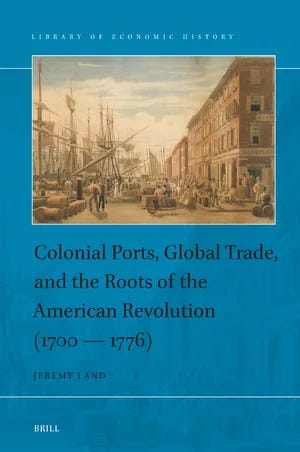The government sought to draw this down in part by taxing its North American colonists, cutting down on smuggling within and beyond the British Empire, and otherwise reversing what Edmund Burke called its “wise and salutary neglect” to enforce its mercantilist policies. By this point, however, North American merchants depended on trans-imperial trade to a greater degree than perhaps anyone realized at the time, and colonial traders were in the vanguard of resistance to Britain’s increasingly burdensome and punitive legislation like the Quartering Act, Stamp Act, and Townshend Acts.
While maritime trade and communication were the lifeblood of all the colonies, Boston, New York, and Philadelphia dominated commercial activity. Most historians have treated these ports individually or taken Boston as representative of New England and New York and Philadelphia as part of the Middle Colonies. In Colonial Ports, Global Trade, and the Roots of the American Revolution (1700–1776), Jeremy Land contends that the three cities and their hinterlands should be considered “as parts of a larger port complex in which each was related to the other in a relationship of competition and complementarity.”
He shows how merchants in Boston, New York, and Philadelphia developed mutually dependent networks of exchange, capital, credit, and even insurance. This perspective makes it easier to understand “their connection to the global economy of the period,” as well as merchants’ support for the revolutionary cause.
Land notes that other scholars have mined British archives to amass statistics about North American trade, but he argues that their reliance on fragmentary data culled primarily from British sources yields an incomplete picture. Specifically, while the numbers show that the colonies had a negative balance of payments with Great Britain, the conclusion that “American merchants were both oriented toward and dependent upon British merchants” is incorrect.
A more expansive view reveals that the volume of tonnage shipped between Boston, New York, and Philadelphia and the rest of the world was greater than the volume of trade between North America and Britain. Although American ships remained within the Atlantic, Asian goods—his focus is on tea, porcelain, and spices—were easily obtained in Dutch and French Caribbean ports, as well as in the Portuguese Atlantic Islands. Despite the risks of arrest by British authorities (which one could insure against), some merchants preferred trans-imperial trade less to evade customs duties than because their own exports—were easier to sell there.
Land makes good use of manuscript records in historical archives in Boston, New York, and Philadelphia, and the Lisbon Municipal Archive, as well as secondary sources. Yet it is puzzling to find almost no mention of India or Indian trade goods, a topic Jonathan Eacott explores at length in Selling Empire: India in the Making of Britain and America, 1600–1830 (2016).
Likewise, while he addresses the topic of risk and insurance, there is no mention of Hannah Farber’s Lyman Award-winning Underwriters of the United States: How Insurance Shaped the American Founding (2021), which devotes two chapters to maritime insurance in the colonies before 1789. Amplification of these subjects would have made an already robust argument stronger still.
Land, Jeremy. Colonial Ports, Global Trade, and the Roots of the American Revolution (1700–1776). Leiden: Brill, 2023.




